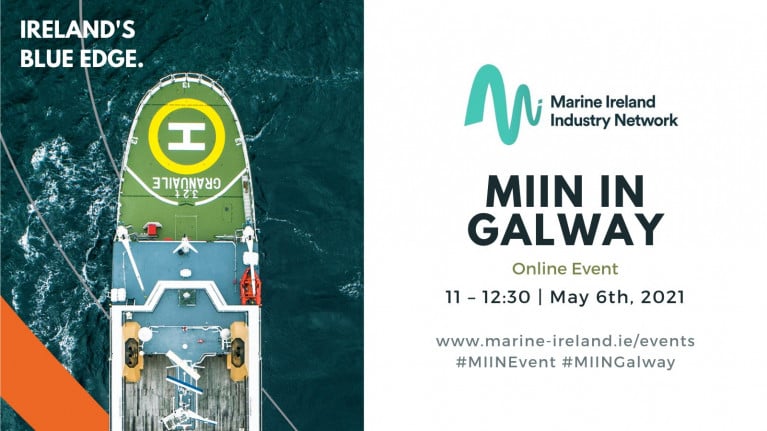Displaying items by tag: MIIN
Blue Bioeconomy Panel List Announced for ‘MIIN in Kerry’ Event
The panel of blue bioeconomy experts has been announced for the Marine Ireland Industry Network’s ‘MIIN in Kerry’ event next week.
Taking place during Bioeconomy Ireland Week on Friday 20 October at the Rose Hotel in Tralee, Co Kerry, as previously reported on Afloat.ie, the event will welcome blue bioeconomy experts as well as national and regional stakeholders a host of marine industry companies to discuss some of the key topics driving sustainability, growth and development of the sector.
The blue bioeconomy panel will be moderated by Máire Éinniu of Údarás na Gaeltachta and includes Catriona Power of Circular Bioeconomy Cluster, John Browne of De Brun Iasc Teo, Tim Yeomans of Shannon ABC and Deirdre Wall of Brandon Bioscience.
Registration for this event is free but limited, so MIIN recommends registering early to avoid disappointment. Those interested can register online and find more information on the MIIN website.
The blue bioeconomy panelists are as follows:
- Máire Éinniu, Údarás na Gaeltachta (moderator): Máire supports high potential start-ups and assisting SMEs with their growth plans, and leading the strategic projects of Páirc na Mara development and Ros a Mhil. Meanwhile, Údarás na Gaeltachta (UnaG) is a regional state agency which is responsible for the economic, social and cultural development of Gaeltacht regions of Ireland.
- Catriona Power, Circular Bioeconomy Cluster (panellist): Catriona is the project lead and contact point for the Circular Bioeconomy Cluster based at Munster Technological University, working at the intersection of innovation, sustainable technology and business for organisations in Canada, UK and Europe. Meanwhile, the Circular Bioeconomy Cluster South-west is the first-of-a-kind regional bioeconomy cluster in Ireland with a focus on marine, agriculture and waste-to-value thematic areas, our goal is to develop and promote the circular bioeconomy in the South-West region.
- John Browne, De Brun Iasc Teo (panellist): De Brun Iasc Teoranta processes seafood in Ireland, and is based in Ballinaboula just outside of Dingle in Co Kerry. Set up in 1984, this second-generation business also supplies many restaurants and cruise ships with crab, prawns and salmon.
- Tim Yeomans, Shannon ABC (panellist): Tim Yeomans works to devise and deliver projects to benefit the company’s bottom line, responsible for business development activities, scientific and strategic development of Shannon ABC, and financial reporting. Shannon ABC was established in 2008 as a collaboration between Limerick IT and IT Tralee, working with companies in the biotech, food, and life science sectors.
- Deirdre Wall, Brandon Bioscience (panellist): Brandon Bioscience is a community of scientists, farmers, and innovators who share the goal of creating a more sustainable future for agriculture. Their mission is to provide targeted performance biostimulants that increase the quality and yield of food crops while delivering excellence in innovation, manufacturing and customer satisfaction. Founded in 1998 in County Kerry, Ireland, they have grown to export precision biostimulants to over 44 countries worldwide.
Supported by Enterprise Ireland and the Marine Institute, MIIN provides a key collaboration resource for Irish companies in the marine sector, facilitating not just inter-company engagement but also providing a one-stop shop for external buyers to get a view of Irish marine industry capability.
MIIN to Host Virtual Event: Blue Skills and Training in the Marine & Maritime Industry - 30 August
Marine Ireland Industry Network (MIIN) is to host the 'Blue Skills and Training in the Marine & Maritime Industry' which will be an Online (Zoom) event held on Tuesday, 30 August (12:00-1300hrs)
The MIIN Virtual Event is to create opportunities for growth and has been organised as a follow up to research commissioned by the Marine Institute and delivered by Flagship Management around marine internships and work placements.
The main findings of this report will be presented, followed by insights from Green Skillsnet on the opportunities and training needs in the Offshore Wind industry, as well as a unique look into the new marine traineeships set-up in the Donegal region.
Training providers from the MIIN Directory will also showcase their available courses.
For further details of the event schedule click here and for a link to register free of charge.
Marine Ireland Industry Network (MIIN) is next week (Thursday, 6th May) to hold an online event 'MIIN in Galway - A Microcosm for Marine Innovation and Industry Opportunities'.
The event (11am-12.30pm) is to focus on innovative marine industrial activities taking place in the Galway region.
MIIN will include opportunities in the marine sector, relevant R&D projects and feature snapshots of four companies actively involved in the industry.
The online event is being facilitated by the team at the newly built GMIT iHub in Galway.
For further information on Speakers and how to register click here.
Noting the Event's running order starts at 11.00am and conclude at 12.30 with afterwards a Q&A session.
























































